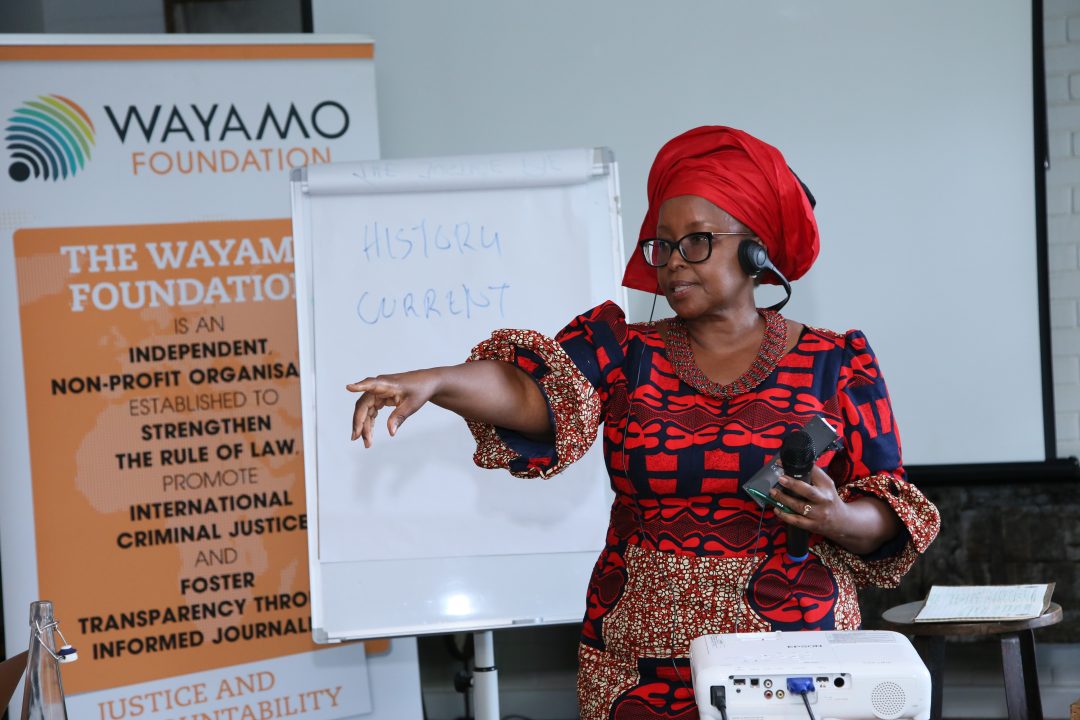The Wayamo Foundation hosted a three-day workshop in Kampala, Uganda, from 21-23 November 2023, to further explore the topic of “Modern forms of evidence and the potential application of universal jurisdiction in the East African region to international crimes committed in Sudan.” The workshop brought together Sudanese lawyers and human rights defenders, including those from Darfur, with experience in strategic litigation and the fight against impunity.
Bettina Ambach, Director of the Wayamo Foundation, opened the workshop and thanked the participants from the Sudanese diaspora based in Kenya, Uganda, Egypt, Qatar and Ethiopia for making the effort to attend. She explained that the capacity-building workshops to be held over the coming months would entail the strengthening of an open-source evidence repository capable of underpinning open-source investigations, the inclusion of international NGOs focused on strategic litigation with experience in universal jurisdiction cases, and the continued efforts of Sudanese lawyers and human rights defenders who are working on case development, documentation and evidence collection.
The workshop aimed to build on the training delivered in Nairobi in July and September 2023, with a continued focus on different accountability mechanisms for international crimes, including the application of universal jurisdiction, investigative practices, modern forms of evidence, particularly open-source information, and examples of such evidence being used in practice. The workshop also featured presentations from The Netherlands Public Prosecution Service on the application of modern forms of evidence in the courtroom, and how that evidence could be used to support universal jurisdiction cases. The training consisted of briefing sessions, discussion and dialogue, as well as a presentation from each group of human rights defenders on its particular area of focus, as regards documentation and the challenges encountered thus far. Through these efforts, it is hoped that a coalition of civil society and legal actors committed to addressing impunity in Sudan will start coming together to pursue international, regional and domestic accountability measures, and foster universal jurisdiction opportunities in the East African region.
The participants engaged with a series of experts, including Wieger Veldhuis, Public Prosecutor for International Crimes, Public Prosecution Service of the Netherlands, Abdalbasit Mohamed, Legal and Research Officer, Wayamo Foundation, Patrick Kroker, Senior Legal Advisor, European Centre for Constitutional and Human Rights, Libby McAvoy, Legal Advisor, Mnemonic, Hannah Bagdasar, Digital Investigations and Accountability Expert and Betty Murungi, Transitional justice expert, Advocate of the High Court of Kenya and member of the Africa Group for Justice and Accountability. The sessions were moderated by Mikel Delagrange, International Criminal Law and Victims Expert, Wayamo Foundation.
An evaluation was conducted at the end of the workshop, in which participants expressed their satisfaction with the topics covered and the quality of the presentations. A sample of the participants comments are highlighted below.
At the end of the workshop, the participants had this to say in their evaluations:
- “There is ample opportunity for documentation beyond just crimes committed; tracking illicit finances is also feasible.”
- “Open-source information can significantly contribute to building criminal cases.”
- “If we want to move from documentation to case-building, we need to find a coordinating body that organises and streamlines the many documentation efforts.”
- “International justice can play a significant role when pursuing accountability domestically.”
- “In the documentation and monitoring field, it’s not about quantity but rather about the quality of information on human rights violations.”
- “International criminal law and its application in domestic settings through universal jurisdiction could be highly beneficial for Sudan.”
The workshop was held in the context of Wayamo’s ongoing project “Capacity building for civil society and the justice sector in Sudan”, which provides training in international criminal law, international humanitarian law and human rights to civil society and legal actors, both in Sudan and the wider East African region, specifically Kenya, aimed at building a coalition committed to addressing impunity through regional and domestic accountability measures, such as national court systems.


